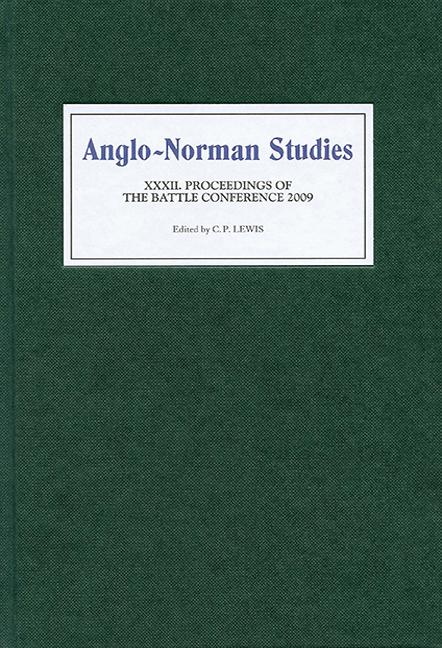Book contents
- Frontmatter
- Contents
- List of Maps and Tables
- Editor's Preface
- Abbreviations
- The Peace of God and Bishops at War in the Gallic Lands from the Late Tenth to the Early Twelfth Century
- Ad erudiendum tradidit: The Upbringing of Angevin Comital Children
- Coming and Going: The Use of Outdoor Space in Norman and Anglo-Norman Chronicles
- The Urban Transformation in England, 900–1100
- The Taming of the Laity: Writing Waltheof and Rebellion in the Twelfth Century
- Close Relations? Some Examples of Trade Links between England and the Towns and Ports of Lower Normandy in the Thirteenth and Early Fourteenth Centuries
- The Roots of the English Royal Forest
- Knighthood and Chivalry in the Histories of the Norman Dukes: Dudo and Benoît
- Prayers for the King and Royal Titles in Anglo-Norman Charters
- Domesday Mortlake
- Miscellaneous Endmatter
Close Relations? Some Examples of Trade Links between England and the Towns and Ports of Lower Normandy in the Thirteenth and Early Fourteenth Centuries
Published online by Cambridge University Press: 28 April 2017
- Frontmatter
- Contents
- List of Maps and Tables
- Editor's Preface
- Abbreviations
- The Peace of God and Bishops at War in the Gallic Lands from the Late Tenth to the Early Twelfth Century
- Ad erudiendum tradidit: The Upbringing of Angevin Comital Children
- Coming and Going: The Use of Outdoor Space in Norman and Anglo-Norman Chronicles
- The Urban Transformation in England, 900–1100
- The Taming of the Laity: Writing Waltheof and Rebellion in the Twelfth Century
- Close Relations? Some Examples of Trade Links between England and the Towns and Ports of Lower Normandy in the Thirteenth and Early Fourteenth Centuries
- The Roots of the English Royal Forest
- Knighthood and Chivalry in the Histories of the Norman Dukes: Dudo and Benoît
- Prayers for the King and Royal Titles in Anglo-Norman Charters
- Domesday Mortlake
- Miscellaneous Endmatter
Summary
It is not my ambition, in the present paper, to offer an overview of the economic relations between western Normandy and England, let alone the whole of the British Isles. Rather, I wish to situate the topic of my current research, and suggest a possible perspective on particular aspects.
Close relations? The question can be asked on several counts. To start with, it is asymmetrical. The scale of the two regions differs as, no doubt, do the issues involved. England appears to be a far more important commercial partner for Lower Normandy than the other way around. Nevertheless, for certain ports in south-west England, Normandy could be a preferential partner. We need, therefore, to think along local lines, on the level of ports rather than larger regional or ‘national’ conglomerations. English sources, which have not yet been analysed fully, often view things in terms of the relations between England, or the British Isles, and the Continent, either in general overviews or in more local studies. Normandy thus appears as one region among others. On the French side, research on the subject is not legion. There is no overview of Normandy equivalent to Michel Mollat's work on commerce at the end of the Middle Ages, which would, by the way, merit fresh research. Lucien Musset's specific studies relate for the most part to an earlier period. The commercial relations between Rouen and England, and London in particular, are slightly better known, but those involving the central and western part of Normandy, which I situate arbitrarily to the west of Dives, rather less so. It is not only a matter here of bilateral relations, but of the wider context of economic exchanges within north-western Europe.
The subject of my research is not limited to the study of commercial relations; it also aims to understand who the merchants crossing the Channel were and what their position was within the society of the towns of Normandy. Indeed it was this line of enquiry which, in part, first dictated my interest in the subject. Documentation specific to Normandy only rarely gives any insight into the activities of the urban elites studied.
- Type
- Chapter
- Information
- Anglo-Norman Studies XXXIIProceedings of the Battle Conference 2009, pp. 96 - 113Publisher: Boydell & BrewerPrint publication year: 2010



